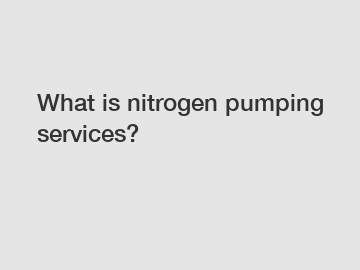What is nitrogen pumping services?
What is nitrogen pumping services? Exploring the applications, benefits, and processes.
Nitrogen pumping services have gained prominence in various industries, owing to their versatile applications and significant benefits. From oil and gas to food processing and beyond, the use of nitrogen in such services has become increasingly crucial. This article aims to shed light on the concept of nitrogen pumping services, examining their applications, benefits, and the processes involved.
Applications of Nitrogen Pumping Services:

1. Oil and Gas Industry:
Nitrogen pumping services play a vital role in the oil and gas industry. Nitrogen can be used to stimulate well production, fracturing reservoir rocks, and enhancing oil and gas recovery. It can also be utilized for nitrogen purging, removing unwanted contaminants and moisture from pipelines and storage tanks. This application not only ensures the safety of operations but also prolongs the lifespan of equipment and helps maintain product quality.
2. Pipeline Maintenance:
Nitrogen pumping services are crucial for maintaining pipeline integrity and preventing corrosion. By displacing oxygen from the pipelines and creating an inert atmosphere, nitrogen ensures that the internal surfaces remain free from oxidation, reducing the risk of corrosion. This protects the pipeline from deterioration, extends its lifespan, and minimizes the need for repairs and replacements.
3. Food Processing:
Nitrogen pumping services find extensive application in the food processing industry. Nitrogen is an effective way to preserve the quality and freshness of packaged food products. It is commonly used for nitrogen flushing, which displaces oxygen from the packaging, preventing food spoilage and inhibiting the growth of harmful bacteria. Consequently, the shelf life of products is extended, reducing the risk of food waste and enhancing food safety.
4. Pharmaceutical Industry:
In the pharmaceutical industry, nitrogen pumping services are utilized for various purposes. Nitrogen is commonly used in the packaging of drugs and medicines to create a controlled environment, preventing degradation and enhancing product stability. Nitrogen can also be used during manufacturing processes to improve efficiency, reduce the risk of contamination, and enhance product quality.
Benefits of Nitrogen Pumping Services:
1. Safety:
One of the significant advantages of nitrogen pumping services is their contribution to operational safety. Nitrogen is an inert gas, which means it does not easily react with other elements or substances. This property makes it ideal for applications where an oxygen-free environment is required, reducing the risk of explosions and fires. Thus, nitrogen pumping services help create safer working conditions for personnel and prevent potential accidents.
2. Cost-Effectiveness:
Nitrogen pumping services can offer cost-effective solutions in numerous industries. By utilizing nitrogen for pipeline maintenance, the need for frequent repairs and replacements due to corrosion can be greatly reduced. Moreover, in the food processing industry, nitrogen flushing extends the shelf life of products, resulting in reduced food waste and improved profitability. The efficiency and versatility of nitrogen pumping services make them an economically viable choice for many sectors.
3. Environmentally Friendly:
Nitrogen is an abundant element in the Earth's atmosphere, making it an environmentally friendly option for various applications. Its inert nature ensures that it does not contribute to air pollution or harm the environment. Additionally, the ability of nitrogen to prevent spoilage and extend the shelf life of products aids in reducing food waste, promoting sustainability, and minimizing the carbon footprint of industries that employ nitrogen pumping services.
Processes Involved in Nitrogen Pumping Services:
1. Nitrogen Generation:
The first step in nitrogen pumping services involves the generation of nitrogen gas. Nitrogen can be produced through various processes, including pressure swing adsorption, membrane separation, and cryogenic distillation. The chosen method depends on factors such as required purity levels and the volume of nitrogen gas needed.
2. Nitrogen Compression:
Once nitrogen is generated, it needs to be compressed to the desired pressure for pumping. This step involves the use of compressors, which increase the pressure of the gas, enabling it to be transported through pipelines and to the desired locations.
3. Nitrogen Pumping:
After compression, the nitrogen gas is pumped into the designated areas using specialized equipment and pipelines. The pumping process varies depending on the specific application, which could range from well stimulation in oil and gas to purging pipelines in various industries.
4. Monitoring and Control:
Throughout the nitrogen pumping process, monitoring and control systems are crucial to ensuring operational efficiency and optimum results. Advanced technology is employed to monitor pressure levels, flow rates, and other essential parameters, guaranteeing the effectiveness of nitrogen pumping services.
In conclusion, nitrogen pumping services offer diverse applications and significant benefits across various industries. From its role in the oil and gas sector to its application in food processing and pharmaceuticals, nitrogen proves its versatility and effectiveness. With safety, cost-effectiveness, and environmental friendliness as key advantages, the use of nitrogen pumping services continues to gain momentum. By understanding the processes involved and harnessing the full potential of nitrogen, industries can optimize their operations and achieve enhanced productivity.
For more information, please visit Sub-sea Pipeline Testing, Sub-sea Pipeline Testing Service, Sub-sea Pipeline Testing News.

Comments
0